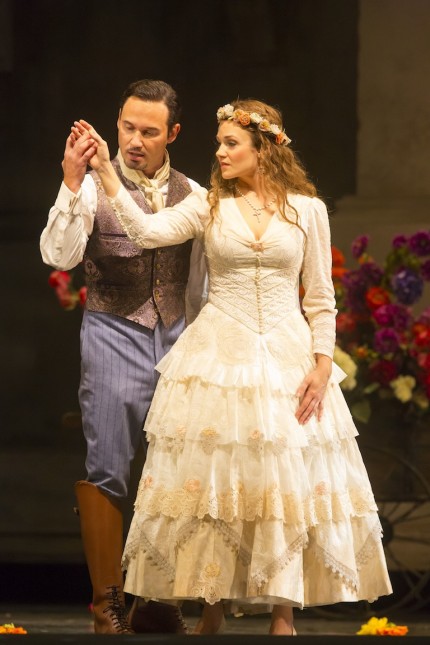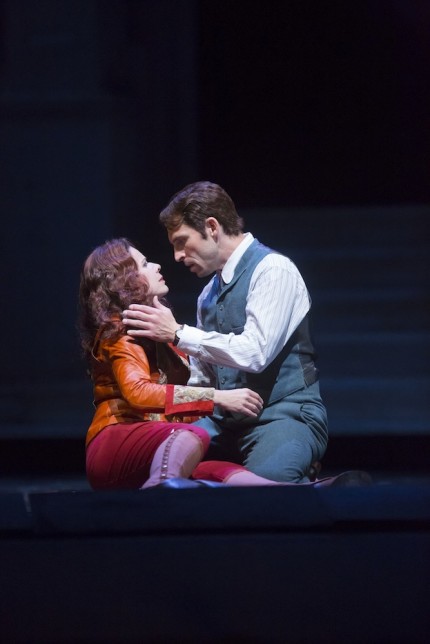Magnificent Mozart: With a brilliant cast and edgy staging, Lyric Opera scores a triumph in “Don Giovanni”

One major initiative of Anthony Freud, general director of the Lyric Opera of Chicago, has been to recruit more theater directors to bring a different slant on familiar works. The largely undistinguished results last season only proved that a lack of opera experience isn’t necessarily the best qualification for directing an opera.
But Saturday night ushered in a new season and a new production of Mozart’s Don Giovanni, with vastly different results. Director Robert Falls’ fresh, boldly conceived staging infused new life into Mozart’s dramma giocoso. Add a world-beater lineup of singers without a weak link and Lyric Opera’s new Don Giovanni gives us one of the company’s finest achievements of recent years. One could hardly think of a better way for the company to kick off its 60th anniversary season.
Mozart’s musical tale of the sexually prodigious libertine whose relentless pursuit of women brings ruin to everyone he touches, and, eventually, himself, is a notoriously difficult work to cast and stage. The lightning shifts between comedy and drama often produce a drama that isn’t very funny or a comedy that isn’t very dramatic.
It’s a testament to the cast and the Tony-winning Falls that both elements were so well served. Indeed, this production is a model of how to reinvigorate a cornerstone work, with an edgy yet thoughtful updating rendered with a respect for the work that leaves Mozart’s glorious music front and center where it belongs.
Falls has directed two shows previously for Lyric Opera: Carlisle Floyd’s Susannah in 1993, the company debut of Renee Fleming (who was in the house last night); and Gian Carlo Menotti’s The Consul in 1996. For this Mozart production, he has fast-forwarded the action to the 1920s in Spain. Walt Spangler’s scenic design is consistently imaginative, centered on a traditional balconied facade of a Spanish house as unit set with striking splashes of flowers and color. Neon cafe signs and lanterns descend to reflect the fast-moving action, trellised ramps paint the pastoral revels, and there is a large Madonna for a church scene in Act 2, and a huge, genuinely spooky Commendatore statue hovering ominously over the graveyard. I won’t spoil the final coup d’theatre, but Falls’ inspiration for the Don’s descent to hell was as surprising and ingenious as it was dramatically effective.
In this updating, the Don is a wealthy, cocaine-sniffing 1920s playboy, and Leporello his long-suffering valet. Yet, within the early 20th-century milieu, Falls and his team treat the characters and their emotions seriously, and allow each of the eight principals to find a dimension of believable humanity beneath the usual stagey cliches. And, of course it didn’t hurt to have a cast of good-looking artists who can act as well as sing.
Even with his dashing charisma there’s an edge of real danger to Mariusz Kwicien’s Giovanni and Falls encouraged that element to come out with full force. This Don may be a charmer with the ladies but, he’s also, as the English say, a right bastard—nasty, selfish and manipulative. He may shoot the Commendatore by accident, but he’s clearly a violent sexual predator into some decidedly rough stuff—as with the bound, bloodied girl as discarded plaything cowering in the corner during the banquet scene. Falls’ showing such unpleasant details wasn’t for mere titillation–rather it invested the opera with a moral force that Don Giovanni rarely possesses in our post-modern 21st-century. This Don isn’t just a flamboyant lover but an evil criminal who richly deserves his fate.
There is no singer in the world that so totally inhabits the role of Don Giovanni as Mariusz Kwiecien. The Polish baritone wielded his robust, burnished baritone with such elegant style and tonal beauty, it was easy to understand why all the women of Europe are dropping at his feet. Kwiecien’s limpid “Deh, vieni alla finestra” serenade and gently insidious “La ci darem” were high among the evening’s many vocal highlights. Dramatically, Kwiecien never struck a single false or awkward note, his commanding portrayal painting a Don who, even reduced to dissolute drug and alcohol dependence, remained a defiant reprobate to the very end.
It’s a tribute to Kyle Ketelsen that he held his own with Kwiecien’s Don, more than is usually the case. The bass-baritone delivered a nimble and witty Catalog Aria and firmly brought out the servant’s seething resentment as well as the men’s camaraderie with a natural conversational quality to their rapid-fire exchanges. The two singers are also about the same height and build, which for once made the identity-switching charade entirely plausible.
Marina Rebeka received mixed notices in her La Traviata Lyric debut last season but seemed mostly at home in the role of Donna Anna, the woman Giovanni assaults and whose father he kills. The Latvian soprano sounded cautious in the coloratura moments yet Rebeka brought a dignity of bearing and purity of tone to the role, with an especially affecting “Non mi dir.”
Ana Maria Martinez’s entrance in tight burgundy pants and motoring goggles—great costuming throughout from Ana Kuzmanic—set the tone for her spunky Donna Elvira. The borderline personality elements of the character—continuously veering from intense love for Giovanni to intense hatred—can seem broadly comic, yet Martinez delved beneath the surface to provide a compassionate and oddly moving and credible example of extreme love. Vocally, Martinez was faultless, singing with fearless fervor, accuracy and sensitivity throughout.
Andriana Chuchman was ideal casting as Zerlina, the peasant girl Giovanni steals away on her wedding day. The soprano brought a charming yet vixenish quality to the good-girl flirt and sang her two arias with notably youthful spirit. As her betrothed Masetto, Michael Sumuel showed a strong bass-baritone and firm sense of class antagonism that etched a character beyond the usual country bumpkin.
Antonio Poli had about as little luck as anyone in trying to bringing depth to Don Ottavio, the vacuous good-guy fiancee of Anna, yet the tenor sang his two arias with lovely tone and sensitivity. Andrea Silvestrelli’s Commendatore was towering in height and sonorous of voice, and the Italian bass’s dramatic entrance in the final scene contributed to the successful theatrical payoff.
Sir Andrew Davis’s tempos in Mozart seem to be getting slower every season and there were times, in Act I especially, when you wanted Lyric’s music director to move things along. After intermission, he picked up the pace, allowing enough expressive space for the arias while investing ensembles with greater vitality.
The Lyric Opera Chorus contributed its customary corporate excellence under Michael Black. Colin Ure’s English title translations were often too slangy (“scumbag”) and colloquial as well as too free with Lorenzo da Ponte’s text.
Never mind. Along with that unforgettable 2008 Lulu—which is overdue for a revival—this Don Giovanni is a high water mark in the past decade of the Lyric Opera. Run, do not walk, to the Civic Opera House and catch this show.
Don Giovanni runs through October 29. lyricopera.org; 312-332-2244.
Posted in Uncategorized






Posted Sep 30, 2014 at 12:22 pm by Bora Benic
EXCELLENT.